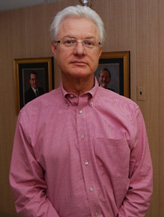Editorial
Front Page - Friday, December 31, 2010
CADAS helps equip addicts with the tools for starting life over
David Laprad
 Paul Fuchcar is the executive director of the Center for Alcoholism and Drug Addiction Services in Chattanooga. A recovering alcoholic, Fuchcar has been sober for 15 years.
- David Laprad
Paul Fuchcar is the executive director of the Center for Alcoholism and Drug Addiction Services in Chattanooga. A recovering alcoholic, Fuchcar has been sober for 15 years.
- David Laprad
A young man walks out of the Center for Alcoholism and Drug Addiction Services in Chattanooga before his quest for sobriety is complete. Both of his parents are using, and his counselor tells him if he goes home before he’s ready, he’ll die. “I know,” the youth replies. Four months later, the counselor’s prediction comes true.
A former bank manager who’s completed the center’s 28-day sobriety program tells CADAS executive director Paul Fuchcar he’s not prepared to go home and asks to be placed in the center’s halfway house. Six months later, he returns to his family sober as the day he was born.
An angry young addict tries to put his fist through a wall at CADAS, which was built when things were made to last. The bones in his hand shatter. Months later, his probation officer calls Fuchcar and says the young man is a U.S. soldier serving in Iraq, and that his superiors have promoted him twice and placed him in a position of responsibility.
Conventional thinking would suggest the second and third clients represent success stories at CADAS, as the individuals sobered up. But Fuchcar says no one at the center measures success in terms of the percentage of patients who leave clean. Rather, their goal is to give the individuals who come to them for help the tools they need to succeed.
“Our adolescent program is 45 days long. Do we think 100 percent of the individuals who go through it are going to live a life free of alcohol and drugs? I’d rather say that for 45 days, we show our adolescents that they can live a happy and successful life without those things.
“I define success differently. Have we started someone on the road to recovery? Have we given him lifelong skills? Even if we’ve done our job, he still needs to have that moment of clarity when he realizes he’s sick and tired of being sick and tired,” Fuchcar says.
A recovering alcoholic, Fuchcar reached that point 15 years ago. Although he hadn’t lost his job or family, he’d been drinking since he was 13, and his brain was telling him he’d die if he stopped. Fuchcar is sober today, and is able to empathize with other substance abusers.
“Many people think substance addictions are a weakness of moral character. They think you just need to pull yourself up by your bootstraps. But addiction isn’t like that. It’s more closely associated with diabetes in that there’s a remedy, and if you take it, you’ll be fine. With diabetes, the remedy is insulin. With addiction, if you follow a program of recovery, then you’ll have every opportunity to live a long and healthy life,” he says.
CADAS utilizes a 12-step recovery program and offers various inpatient and outpatient services to help people learn how to live sober. Low-level services include a DUI school and prevention programs for at-risk teens; mid-level services include outpatient programs involving group therapy; the next level up is residential treatment for people who need additional structure.
“Resident treatment is for people who will have a tough time remaining sober in an outpatient environment. For 28 days, we provide those individuals with structure. At the end of those four weeks, we’ll take a look and see how it went. We recommend people move from residential to outpatient therapy. The longer we can engage someone in a treatment program, the greater his chances for success,” Fuchcar says.
CADAS provides several levels of residential treatment as well, the most severe of which is medical detoxification. The center is also able to house men, women with children, and adolescents in its central facility on Spears Avenue and two other nearby sites.
“We have 40 beds at our residential treatment center for adolescents. Thirty-eight of those beds are occupied. We’re licensed for 48 adult beds, and they’re all full,” Fuchcar says.
Because addictive substances do not discriminate, people from all walks of life have sought help at CADAS. The staff at the center doesn’t show favoritism either, so it’s not uncommon to find a homeless person in the same room as a white collar professional.
“That raises their anxiety level, and what comes out of that is better treatment. Both individuals quickly realize the only difference between them is a few nickels. Other than that, they’re the same person with the same issues,” Fuchcar says.
While the work is challenging, Fuchcar says it’s also tremendously rewarding. He’s also proud of his staff.
“They’re good diamond polishers. We get all kinds of diamonds in here, and all we do is polish them up. When they leave, they’re the same stone as when they walked in,” he says.
For more information about CADAS, visit www.cadas.org. Fuchcar says most of the people who contact the center for help are family members or friends of substance abusers.
|
|